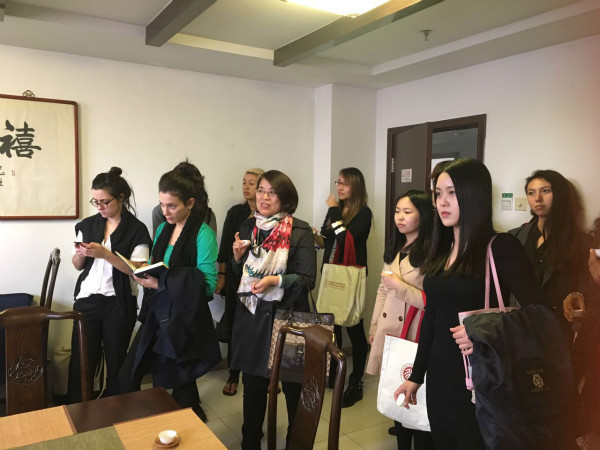By Mary Schulman
On Thursday afternoon, October 13, 2016, the Scholars in the Yenching Academy course Women in Contemporary China visited the Haidian District Activities Center for Women and Children. The Activities Center is a public service organization under the jurisdiction of the Haidian District branch of the All-China Women’s Federation, which is itself affiliated with the Chinese government. Its mission is to serve the women and children of Haidian by providing activities and continuing education classes (especially in physical education and the arts) free of charge.
The Center graciously allowed the Yenching Scholars to tour the facility and observe several of their classes in session. The visit was an important part of the curriculum for the course Women in Contemporary China, which focuses on the status of women in modern-day China and on the All-China Women’s Federation. The scholars were accompanied by Li Yingtao, Professor of feminism and international relations of Beijing Foreign Studies University, and by Jiang Guohua, Associate Dean of Yenching Academy.

We began our visit by viewing a long scroll painting titled Three Hills and Five Gardens. The painting depicts several of the iconic cultural landmarks of Haidian District, including Yuanmingyuan Palace and Qinghuayuan Park. The images are drawn in a traditional Chinese brushstroke style using blue and black ink. The painting was created by a group of female artists in their 50s and 60s who learned their craft right here at the Activities Center. We were impressed by the painting’s delicate beauty and intricate detail; Haidian District seemed to come to life on the page.
After we viewed the painting, the Center’s Director led us on a tour of the building. There were many classes in session during the afternoon, and we had the privilege of observing them and, in some cases, speaking with the instructors. We noticed right away that the Center places strong emphasis on traditional Chinese arts in particular—the first classes we observed were tai chi, traditional Chinese dance, and the tea ceremony. The instructor of the tea ceremony class invited us to sample teas from different provinces in China; he explained their origins, flavors, and the medicinal properties they are believed to have.
The next class we observed was sewing; the women taking this course learn how to create their very own clothing and pillows. Several of their creations, including traditional white and blue silk qipao (Chinese dresses) with designs from the Three Hills and Five Gardens, were displayed in the classroom. The instructor explained that sewing is not merely an enjoyable pastime for these women – the Center encourages them to put their skills to use by teaching others in the community how to sew or by selling their creations to earn revenue for themselves and their families.
In the calligraphy class, the women of Haidian can learn a variety of calligraphic styles, including an ancient style called xiaozhuan that dates back over 2,000 years. The calligraphy teacher helped one Yenching Scholar write her name in thexiaozhuan script, and explained that the Chinese characters in her name had the literal meaning of “beautiful.” He also explained the history of xiaozhuan (which was invented during the reign of the First Emperor of China) and demonstrated that many characters in that script were designed to resemble the objects they represent. For instance, he drew the character for “morning,” which was composed of a stylized sun (a box with a dot inside) rising over a horizontal line representing the Pacific Ocean. The Yenching Scholars had the chance to practice their own calligraphy and take their masterpieces home.
Our next stop was the Artisan Room, which showcased exquisite handmade objects such as jewelry and embroidery created by local artists (all of whom had been trained at the Activities Center). In Chinese, the term for such handicrafts is qiaoniang, which literally translates to “clever lady,” because these crafts have been traditionally practiced by women in China. One of the most spectacular pieces was a larger-than-life bouquet of brightly colored flowers made from clay. We had the chance to observe a class devoted entirely to the creation of these flowers. We watched as the artists carefully arranged colored clay into flower shapes. As with the sewing class, the purpose of the clay flower making class was to give these women a chance to make their own flowers and sell them in order to earn some income for themselves. Our last stop was the Culinary Room, where residents of Haidian can learn the cooking styles of all the different provinces of China; the women there specially prepared for us baked bread with a sauce made in the style of Henan Province.

At the conclusion of our tour, the Center presented each Scholar with a small gift – a lovely coaster featuring a flower design and the logo of the Beijing Women’s International Center. In return, our gift to them was a card with the word “thank you” translated into each of the many native languages of our international scholars.
Jenna Cook, a Yenching Scholar from the United States, found the visit to the Activities Center to be a rewarding experience. “The All-China Women’s Federation Beijing leaders and the Haidian Center leaders were so kind and welcoming to our whole group,” she said. “They invited us to try calligraphy and clay flower making, as well as to sample the fresh bread made by the women in their cooking class. The walls were filled with photographs and messages from many international groups who had visited the center in recent years. I could sense that the center is a prominent hub for international cultural exchange.”